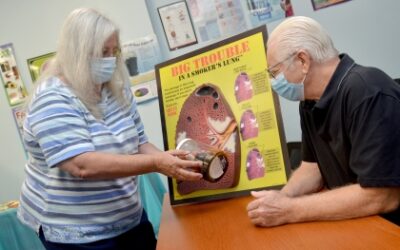WINSTON-SALEM, NC.—Managing multiple medications poses a challenge for many older patients. Forty percent of people in the United States over the age of 65 regularly take five or more drugs, meeting the definition of polypharmacy. For patients with hematologic...
VHA Data: Migraine Is a Commonly Treated Condition Among Veterans
Migraine is a commonly treated condition at the Veteran’s Health Administration (VHA), with more than half-million veterans being diagnosed during a 12-year study period, according to a recent study.
COVID-19 Can Lead to Long-term Neurologic Disorders; Even Veterans With Mild Illness Could Be Affected
Patients face an increased risk of long-term neurologic conditions after suffering from COVID-19, including stroke, cognition and memory disorders, nervous system disorders, mental health disorders and more, according to a study examining the long-term effects of COVID-19.
Military Study: Biomarkers Can Identify Risk for TBI-Related Dementia
Several studies have found a link between traumatic brain injury (TBI) and an increased likelihood of late-life dementia. The mechanisms driving the relationship have remained elusive, however.
Model Helps Predict Mortality Prognosis for AD, Dementia Patients
Dementia is a leading cause of morbidity and mortality worldwide and is associated with increased mortality risk.
Glitazones Decrease Risk of Alzheimer’s, Other Dementia in Veterans’ Study
The risk of dementia, including Alzheimer’s disease, appeared to be reduced in veterans prescribed an older class of type 2 diabetes drugs, glitazones.
Adjuvant Chemotherapy for All Stage II or III NSCLC? VA Study Urges Caution
Patients with non-metastatic non-small cell lung cancer (NSCLC) face a substantial risk of recurrence and death from the disease even after potentially curative surgical resection.
VA Demonstrates Ethnic Variations in Response to NSCLC Treatment Not Dependent on Access
The Food and Drug Administration approval of the first immune checkpoint inhibitor for non-small lung cancer (NSCLC) changed the course of the disease for many patients and increased survival rates.
Dietician Mary Julius Champions VA’s Virtual Diabetes Education Program
When Mary Julius was diagnosed with Type 1 diabetes in 1974, the world was a very different place. There were only approximately 4.5 million Americans who had been diagnosed with diabetes.
DoD and VA Update Guideline for Management of Major Depressive Disorder
Expansion of interventional psychiatry and updated algorithms to help guide physicians in making choices about therapies for depression are among important updates included in the newly revised 2022 VA-DoD Clinical Practice Guideline for Management of Major Depressive Disorder.
Association Found Between Battlefield TBI, Subsequent Cardiovascular Disease
Traumatic brain injury (TBI) was common among U.S. servicemembers deployed to Iraq and Afghanistan, with up to 20% sustaining at least one TBI. Although the survival rate for such injury was high, research has suggested TBI is associated with a wide variety of adverse effects, including dementia, epilepsy and mental health conditions.
Smokers With Preserved Lung Function Not Helped by Dual Bronchodilators
Long-term smokers often have serious respiratory symptoms, but without airflow obstruction. A new study questioned whether those patients should be treated with drugs used for chronic obstructive pulmonary disease (COPD).
Pandemic Didn’t Delay Colonoscopies for Veterans With ‘Red Flag’ Symptoms
Concerns have been raised over the past few years that, because of the COVID-19 pandemic, VHA patients with “red flag signs or symptoms” of colorectal cancer (CRC) did not receive prompt colonoscopy workups.
Hepatitis C Drugs Show Promise in Reducing PTSD Symptoms in Veterans
Direct-acting antivirals used in the treatment of the hepatitis C virus might improve symptoms of post-traumatic stress disorder (PTSD), potentially offering a new therapeutic option for a prevalent disease with few approved medications, according to a new study.
VA Program Successfully Reduces Post-Operative Opioid Prescriptions
Drug overdose is the leading cause of injury-related death in the United States. For many, initial exposure to opioids occurs in the hospital following surgery, and current studies show that up to 75% of post-operative patients have unused opioid pills after discharge.
Hurricanes, Sea Level Rise Endanger Hospitals on Atlantic, Gulf Coasts
In late September, Hurricane Ian, a deadly Category 4 storm, caused widespread damage, flooding, loss of power and evacuations from hospitals and nursing homes across Cuba and the U.S. Southeast, especially Florida and South Carolina.
VA Ceases All New EHR Activities Until At Least Next Summer
All upcoming deployments of VA’s new electronic healthcare record system will be halted until at least June 2023, the agency announced. This is in response to continuing issues with the system at its pilot site in Spokane, WA, as well as the handful of sites that followed.
Community Care Approaches Half of All VA-Funded Medical Services
The VA is approaching a point where one-half of all care paid for by the healthcare system will be delivered through community providers. Outside care accounted for 44% of all VA health services last year, it said.
Overall Prescriptions Are Low at VHA for CVD, CKD Protective Diabetes Drugs
Even though novel therapies for type 2 diabetes have been proven to reduce the risk of cardiovascular disease and chronic kidney disease progression, VHA prescription rates remain low.
Second COVID Booster Significantly Protected Nursing Home Residents
Among nearly 10,000 nursing home residents in the United States included in a recent VA-led study, second mRNA COVID-19 vaccine booster doses provided significant additional protection over first booster doses against severe COVID-19 outcomes, even though the Omicron variants were emerging.
Grants Could Help Lower Suicides Among Native American Veterans
VA recently announced that it has awarded $52 million in grants to 80 community-based organizations to deliver or coordinate suicide prevention programs and services for veterans and their family members.
VA Patients Not Told About Risks of COVID-19 Drug Remdesivir Under EUA
VA failed to provide many COVID-19 patients with all the required information when prescribing them remdesivir, according to a recent VA Office of the Inspector General (OIG) report.
Selection of Supply Chain Management Will Be Test of VA’s New Acquisition Framework to Assure Agency Gets Value for Its Money
As VA moves forward with its long-delayed search for a supply chain management system, the department plans to use the process as a de-facto trial of its new acquisitions’ framework–a system designed to ensure the department uses its money effectively when it comes to major projects.
Intimate Partner Violence More Common With Veterans, Military Personnel
VA should be doing more to identify and support victims of intimate partner violence (IPV), according to a recent VA Office of the Inspector General (OIG) report that also maintained that programs already in place are inconsistently implemented.
Many Veterans are Hesitant to Seek Help for Sleep Problems, Alcohol Abuse
Military service and trauma have been linked to an increased risk for substance abuse and mental health disorders. Yet research suggests a lack of willingness to seek treatment for these problems keeps many veterans from getting the help they need.
His place shall never be with those cold and timid souls who neither know victory nor defeat
President Roosevelt’s quote is long, but worth every word. I have a soft spot in my heart for Teddy, since he is my favorite president and my great-grandfather, Anton Buckenmaier, was a Rough Rider. I have been aware of these sage words from our 26th president for most of my career. They have served as an inspiration and guide for critical decisions I have made concerning the direction of my professional pursuits. I would never be so vain as to suggest I could improve Teddy’s profound eloquence in his quote. Then again, I have often summed up the meaning of his words (to appease my goldfish-like memory) when I have had a resident cornered and lecturing. My crass and unpoetic summary of his masterful paragraph: There are those that do and those that don’t.
Recommendations Could Standardize Care for VA Patients With AML, CLL
The VA has committed to providing quality oncology care, with the establishment of the National Oncology Program and a system of excellence designed to spread best practices in cancer care to VA facilities around the country.
VA Research Provides Insight into Quality of Life After Blood, Marrow Transplant
Patients with acute myeloid leukemia (AML) face difficult choices if their cancer recurs. Without treatment, survival is a matter of months.
Achieving Treatment-Free Remission in CML: Best Approaches, Best Candidates
In less than two decades, the advent of targeted therapies transformed chronic myeloid leukemia (CML) from a death sentence with a five-year survival rate of just 22% to a chronic condition with five-year survival exceeding 90%.
VA Researchers Develop AI-based Tool to Predict Post-transplant Relapse in AML
Despite advances in treatment, acute myeloid leukemia (AML) remains the most deadly blood malignancy, with a five-year survival rate of 26% for people over age 20.



